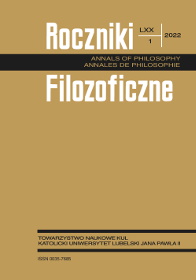Some Musings about William Hasker’s Philosophy of Mind
Abstract
While William Hasker and I for the most part broadly agree in our opposition to much of the contemporary philosophical community concerning issues in the philosophy of mind that he discusses in his book, there are nevertheless seemingly some domestic disputes between him and me about certain matters concerning the nature of events involving the self. In this paper, I will focus on two of these disagreements. The first disagreement concerns Hasker’s treatment of what is widely known today as the argument from reason and whether the events involved in our reasoning are essentially causal or teleological in nature. The second disagreement is about Hasker’s account of libertarian freedom, and whether agent causation is required to explain our free choices.
References
Goetz, Stewart. 2005. “On Behalf of Emergent Dualism: A Substance Dualist Response.” In In Search of the Soul: Four Views of the Mind Body Problem, edited by Joel B. Green and Stuart L. Palmer, 101–4. Downers Grove, IL: InterVarsity Press.
Goetz, Stewart. 2008. Freedom, Teleology, and Evil. New York: Continuum.
Hasker, William. 1999. The Emergent Self. Ithaca, NY: Cornell University Press.
Copyright (c) 2022 Roczniki Filozoficzne

This work is licensed under a Creative Commons Attribution-NonCommercial-NoDerivatives 4.0 International License.





